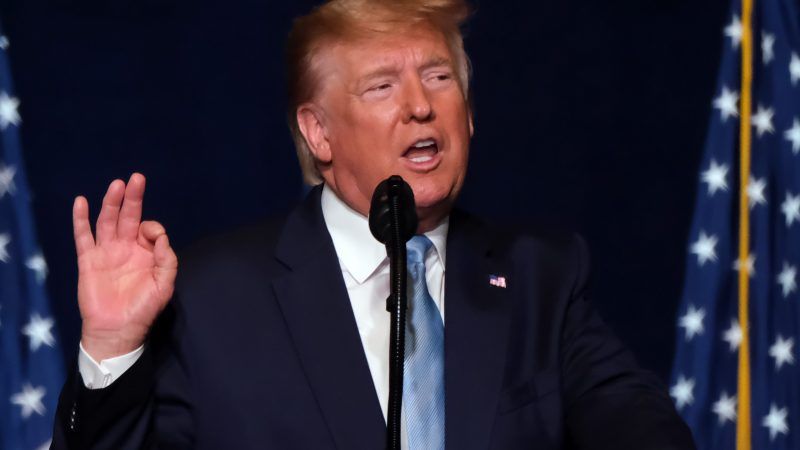Without Evidence of 'Imminent' Attack on Americans, the White House's Justification for Killing Iranian General Seems Hollow
Reports now suggest that Trump took the unprecedented step of killing a foreign leader based on thin evidence of a threat and with an eye toward domestic politics.

The White House claims that this week's assassination of a top Iranian general, Qassem Soleimani, was necessary to prevent an imminent attack against Americans in Iraq and around the wider Middle East.
Soleimani "was actively plotting in the region to take actions, the big action as he described it, that would have put dozens if not hundreds of American lives at risk," Secretary of State Mike Pompeo said Friday. "We know it was imminent."
But 48 hours after the drone attack that claimed Soleimani's life, that narrative is starting to unravel amid reports that Trump took the unprecedented step of killing a foreign leader based on thin evidence of a threat and with an eye toward domestic politics. Indeed, the administration has so far provided little evidence that killing Soleimani has made Americans objectively safer—while the strike has clearly worsened the status quo by raising the likelihood of Iranian reprisals and the prospect for open war.
Citing two unnamed U.S. intelligence officials who have been briefed on the Soleimani assassination, Rukmini Callimachi, the New York Times' top correspondent covering ISIS and the War on Terror, reports that "evidence suggesting there was to be an imminent attack on American targets is 'razor thin'" and that the Trump administration made an "illogical leap" in deciding to kill Soleimani.
6. One official described the planning for the strike as chaotic. The official says that following the attack on an Iraqi base which killed an American contractor circa Dec. 27, Trump was presented a menu of options for how to retaliate. Killing Suleimani was the "far out option"
— Rukmini Callimachi (@rcallimachi) January 4, 2020
Why would Trump opt for a "far out" plan like assassinating a foreign official—an act of war, make no mistake about it—when other presidents have passed on the opportunity to do so?
It could be simply Trump being Trump. The president wrote on Twitter that Soleimani "should have been taken out many years ago." And Vice President Mike Pence expanded on that idea in a thread posted to Twitter on Friday in which he laid out a long history of Soleimani's involvement in everything from the 9/11 plot to various attacks conducted by Iranian-backed militia since America invaded Iraq.
There's no doubt that Soleimani has blood on his hands and that he worked to make America's ill-conceived occupation of Iraq even more of a disaster than it already was. It's highly likely that he was still doing that when he was killed on Thursday. But there's a big gap between saying that Soleimani was killed for his track record going back years or decades versus saying—as the White House and State Department have officially stated—that he was killed to prevent some impending, immediate threat.
And this distinction matters. It matters as a philosophical or moral concern regarding how America will continue exercising its global police powers. Is the standard for assassinating foreign officials now as murky and minimal as proclaiming them to be "bad guys?"
More importantly, it should matter in a very practical way to anyone who wants to soberly assess whether the White House did the right thing in droning Soleimani this week. The attack has ratcheted up tensions, caused the State Department to warn Americans to leave Iraq immediately (even if that means fleeing across the desert into another unfriendly country), and resulted in the Pentagon ordering thousands more Americans into harm's way. The onus is on the White House to prove that the alternative—not killing Soleimani—would have been worse.
But it doesn't seem like that was the calculus that actually drove the decision to kill Soleimani at all. The Washington Post reports that Trump was "motivated to act by what he felt was negative coverage after his 2019 decision to call off the airstrike after Iran downed the U.S. surveillance drone." (For what it's worth, I praised Trump when he called off that 2019 airstrike, a decision that likely saved dozens of lives and may have averted war.)
Taken together, the reporting from the Post and the Times paint a picture of Trump making a crucial decision that could put lives at stake and further destabilize the Middle East because he wanted the media to portray him as a tough guy. Rather than facing down an immediate threat, it seems like the White House has created a much more dangerous situation because it retaliated against Soleimani for any number of prior offenses, including the attacks at the U.S. embassy in Baghdad last week.
That's not the official story, of course, because as terrifying as "we assassinated a foreign official just because we wanted to, risk of war be damned" might be, "we assassinated a foreign official on a whim so the president would look like the tough guy portrayed in MAGA memes" sounds even worse.


Show Comments (642)